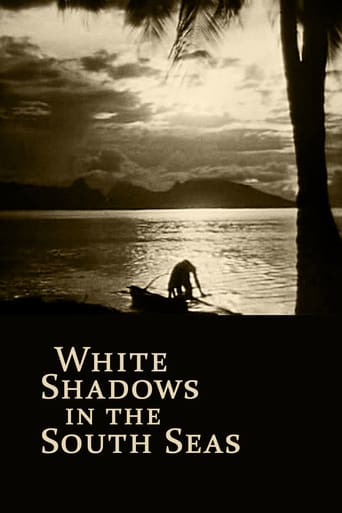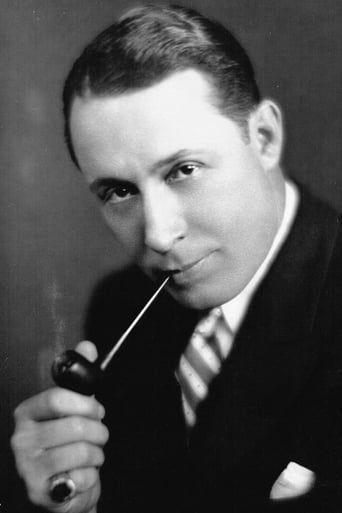Incannerax
What a waste of my time!!!
Lovesusti
The Worst Film Ever
Protraph
Lack of good storyline.
RipDelight
This is a tender, generous movie that likes its characters and presents them as real people, full of flaws and strengths.
cstotlar-1
I saw this film years ago at the Cinematheque in Paris, along with "Moana" and "Tabu". We think of Murnau as a supremely gifted director and Flaherty as an extremely talented documentarist. In fact, Flaherty was involved in all three films, finally directing "Moana" in the end. All three directors ended up going in quite different directions and somehow Van Dyke's marvelous film got lost in the struggle. In fact, his film survived any competition and is still wonderful to watch. It helps to remember too that Van Dyke was very much a studio director, Murnau was quite foreign to the system and Flaherty was not only painfully slow but hardly ever compromised with other directors, not to mention studio heads. Van Dyke came out with a great film and it's all his and his alone.Curtis Stotlar
Michael Morrison
Woody Van Dyke was a prolific director, with many well-loved and classic movies helmed by him. "White Shadows in the South Seas" is one of his best, showing a mastery of camera use and a skill in leading his cast.Monte Blue was, likewise, a very prolific actor, but his lead role here has to be one of his best, and one of his best performances. He was very affecting, very touching, and even handled the pre-Yakima Canutt fight scenes well.There is a realism to this movie that caught my attention, even though I am very familiar with the silent genre, having been, for example, a regular for years at the old Silent Movie Theatre in Los Angeles when it was run by the great John Hampton.As others have commented here, the beauty of the location joined with the quality of the acting and directing make this masterpiece a cinematic experience, and I urge everyone to grab any opportunity to watch it.
MartinHafer
This is the tale of a doctor who is disgusted at the greed of the White sailors who plunder and exploit the Polynesian natives. Risking their lives to retrieve huge pearls, the locals are given mere trinkets. And, when a few die, the Whites take no heed. But, when the doctor has had enough and verbally attacks these "businessmen", his is tied to the wheel of a ship full of plague victims and cast adrift. Fortunately, he finds an unspoiled island full of sweet villagers. Will the wicked White men come and destroy this paradise, too, or will the doctor find the peace he so craves? The film has amazingly good cinematography and it's nice to see that the crew went to Tahiti to film. Additionally, the film is innovative because it's MGM's first sound film, though like most of these early films, it is NOT all-sound, but uses some synchronized music and sound effects. At the time, audiences were spellbound--today it just seems like a nice silent film with some added sound and nothing more. The story is very good and compelling, though at times a bit too earnest and preachy about those "White Devils" and their greed.I am a huge fan of F.W. Murnau, the great German director. While he did some wonderful and very advanced films (such as NOSFERATU, FAUST and THE LAST LAUGH), somehow the final film in his career (TABU, 1931) has also been accorded 'classic status'--even though it was a silent film made in 1931. In addition, you can't help but think that Murnau was copying WHITE SHADOWS IN THE SOUTH SEAS--as the films seem very similar to me. However, WHITE SHADOWS was an innovative film with synchronized sound and music. By 1931, sound was the standard in many nations and Murnau's making a silent seemed a bit out of date. If I had to watch just one of these films, I'd pick WHITE SHADOWS.
ksf-2
The very first "sound track" film from MGM..sound effects track added by Doug Shearer, who did the sound recording on about 90% of all the old black & whites. Caption cards are still used throughout the film for the dialogue. Was also actually filmed in Tahiti, which would have been pretty rare for those times. Monte Blue ( plays Doctor Lloyd ) and Robert Anderson (the trader) had been in silent films for years, but this was Raquel Torres' ("Fayaway") first role. In our story, when pearls are discovered in the waters of the south seas, the white men move in to take advantage. The natives are up against the caucasian traders, the critters of the sea, storms, and sickness when it comes to their shores. The story is quite simple, but the outdoor and underwater photography are the high points here. Even with a respectable restoration, different scenes appear in various colors, and the lighting and sound have become slightly spotty. Interesting scenes at the feast, where prior to cooking, the fish is carefully sewn up in leaves to keep it from burning. Where others have despaired over the "documentary" feel to the film, I felt that this was one of the strengths. (Although some of those costumes and dances DO look pretty hokey.) Lloyd lives with the natives, and must decide what his long term goal is, and how to reach it. Several scenes have been sped up, which may have been an effort by "someone" to move the plot along more quickly. Directed by WS Van Dyke, produced by Thalberg and Stromberg, all pretty big cheeses in the industry at the time.

